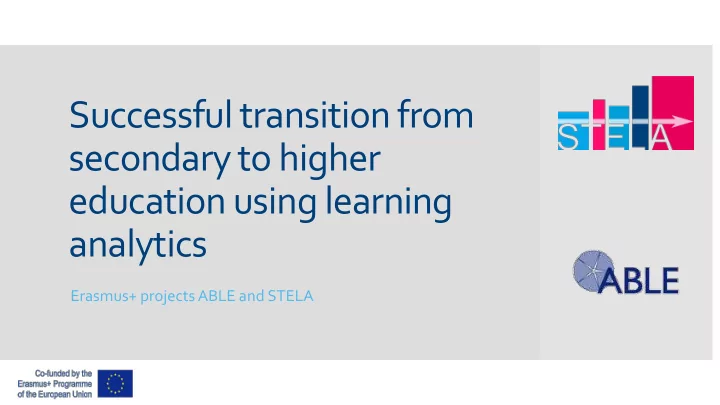

Successful transition from secondary to higher education using learning analytics Erasmus+ projects ABLE and STELA
1. ABLE project overview 2. STELA project 3. findings & recommendations
1/3ABLE project Erasmus+ (Strategic Partnership 2015-1-UK01-KA203-013767) ableproject.eu
strategic partnership, launched in September 2015 How to apply learning analytics to support the transition from secondary to higher education? ABLE: 1. Identify strategies for integrating institutional support around data goals generated by Learning Analytics. 2. Strengthen research into first year experience and transfer domain knowledge to Learning Analytics interventions. 3. Provide recommendations and resources to the sector.
Nottingham Trent University KU Leuven & University Leiden ABLE: institution-wide dashboard dashboard to support the live interaction between student and double external provider advisor approach focus on engagement dedicated development engagement focus on study success progression & attainment early academic performance long term study success
ABLE: Nottingham
ABLE: Nottingham
impact: how similar profiles did in the past name student position students in peer group ABLE: Leuven/Leiden guided planning of future study pathway
2/3STELA project Erasmus+ (562167-EPP-1-2015-1-BE-EPPKA3-PI-FORWARD) stela-project.eu
Forward looking cooperation project, launched in November 2015 How to apply learning analytics to support the transition from secondary to higher education? STELA: 1. student-centered goals 2. beyond identifying at-risk students: inclusive approach for every student 3. beyond single courses: focus on the entire program 4. actionable feedback, ability to remediate
four focus areas three main approaches 1. performance 1. position students with respect to peers 2. engagement STELA: 2. show how other students 3. skills project ideas with similar profile did in 4. well-being the past 3. feedback loop
STELA Privacy by Design Privacy Engineering
3/3 Findings & Recommendations What we’ve learned so far.
Learning Results from online learning, open universities, MOOC’s … cannot Analytics in a be transferred directly to traditional academic contexts. traditional Data is less straightforward to collect, information is sparser and it learning is difficult to get a complete picture. context is a Careful: we should not move away from traditional face-to-face challenge. teaching just for the sake of learning analytics.
academic performance strong relation to study success widely available REC 1: digital traces of behavior Focus on data card swipes, in-class polls, lab attendance that is virtual learning environment available. survey data strong body of knowledge in pedagogic research REC 3
REC 2: Take learning Which activities are expected? analytics into Can these activities leave behind learning traces? account when redesigning learning.
Most successful students finish at least 15 online modules. example: blended None of the students that accessed less then learning 1o online modules passed the exam. Mechanics 101 at KU Leuven
Learning analytics tends to have a “big data” bias. REC 3: We can learn from pedagogy and psychology Think beyond self-reported (small) data the obvious. standardised tests.
Shows a student how he or she is similar to peers. example: academic skills feedback at KU Leuven Shows how other students did last year.
Privacy and ethics are big issues! Rules and practices differ from country to country and from institution to institution. Nottingham Trent University (UK): full access (to card swipes, …). privacy and KU Leuven (BE): vice-rector directly involved to unlock / fast track debate. ethics TU Delft (NL): lots of freedom for MOOC’s, restricted for regular students. TU Graz (AU): very strict regulations. Every project has to spend a lot of effort = huge loss of resources and focus!
REC 4: Traditional educational setting should not be disadvantaged There is a need compared with MOOC’s etc. for clear Eliminate differences between educational institutions and national and commercial entrants. European Quick win: provide model agreements for institutions to use and policies for adapt to specific needs. learning analytics.
actionable feedback: focus on what can be improved involve all stakeholders students, student unions REC 5: study advisors Focus on teachers actionable management feedback. policy makers provide guidelines and good examples
data is stored in operational silo’s: academic performance central IT system data silo’s behavioral data virtual learning environment survey data different for every faculty difficult to assemble an holistic view on the student
example from Nottingham Trent University: REC 6: UK government requires retention and attendance data Develop all UK institutions track, store and report this data opportunity for Learning Analytics. common data requirements. But: institution should remain owner of the data!
Open source remains preferred license model for new projects. However, universities often rely on proprietary software campus administration systems (e.g. SAP) REC 7: not necessary a bad choice! Stimulate flexible Project should focus on flexible solutions: open source components that can be software integrated within existing systems. solutions. reproducible blueprints preferred over highly specific solutions. Beware of not-invented-here syndrome (NIHS): many great puzzle pieces are readily available.
Example: STELA blueprint Focus is on drawing the arrows
REC 8: Provide a Many offers available, of varying quality! checklist to Both institutions and providers need guidelines to avoid mistakes. evaluate tools Example: data ownership (cloud solutions) and resources.
REC 9: European collaboration is not always easy, but very stimulating! Keep on Partners learn from each other and push progress funding in their own nations. European Examples: collaboration ABLE: Leiden pushes for data access to support study advisors projects. STELA: Graz pushes for feedback to students
REC 1: Focus on data that is available. REC 2: Take learning analytics into account when redesigning learning. REC 3: Think beyond the obvious. REC 4: need for clear national and European policies for learning analytics. STELA + ABLE REC 5: Focus on actionable feedback. recommendations REC 6: Develop common data requirements. REC 7: Stimulate flexible software solutions. REC 8: Provide a checklist to evaluate tools and resources. REC 9: Keep on funding European collaboration projects.
useful projects for Learning Analytics in European context conclusion interesting findings and recommendations so far … … more to come soon
Recommend
More recommend